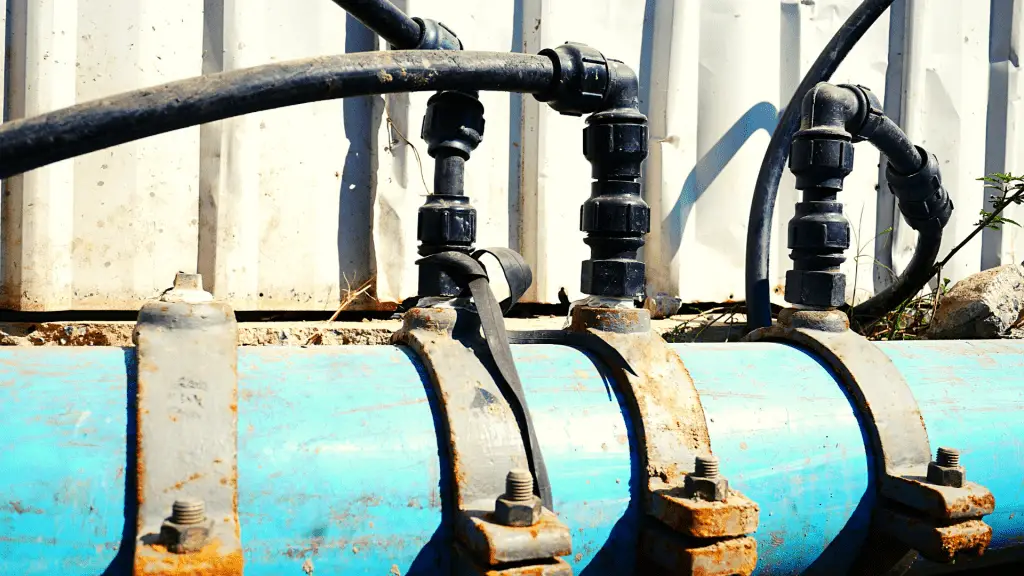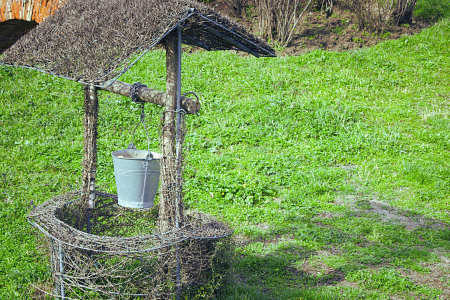It doesn’t seem possible to run out of water from a well, but it does happen. When it happens it is never overnight, however.
There are 6 main signs that your well is running dry. Usually you can tell just based on the taste of your water or if you water looks muddy. But a sputtering faucet and a pump that is constantly running are common indications that your well has run dry.
In this article, I will go over all the signs to watch for, and also, what could be confused for a dry well. Then, I will give you a few tips on how to best fix a dry well.
Signs Your Well is Running Dry
There are a few main signs to look out for in a dry well that are fairly common. Here are the main ways of knowing your well is running dry.
The Well is Pumping Air
If you turn on a fixture like a faucet or a shower and it blasts air, then something is wrong. It’s likely that the water level has dropped and air getting pumped in with the water.
This is not a sure sign as it can be a faulty pump or a leaking pipe, but it is something that should be checked out immediately.
Your Water Is Sandy Or Muddy
When the water sputters out of the tap and also looks like it has some sediment, then it could mean that your well is about to run dry.
Some wells have sediment even when they aren’t running dry. Many people use a sediment filter for their well water since a pump is usually located near the bottom of the well.
Murky or sandy water on its own is not a sure sign that your well is running dry. However, if you have a filter and it still has lots of sand and you’re seeing some of these other signs, then it is time to be concerned.
If you don’t see any other signs besides this one and don’t have a sand and sediment trapper, then this is a good time to get one.
The Pump Is Always Running
As your water level gets lower, the pump will struggle to build up enough pressure to get the water out. You’ll hear the pump on for much longer than it used to.
Another sign is the pump switching on and off continuously. Usually, the pump is deep under the water, but when the level drops, it is always trying to get that water into the pressure tank.
Water Tastes and Smells Funny
The bottom of your well is a murky place. If your water is low, then the sediment gets kicked up and swirls around the pump. Ordinarily, this would be undisturbed at the bottom of the well and the pump would have plenty of clean, fresh water to pump.
If the water looks yellowish, then this usually means that there are some organic particles suspended in the water. Water level dropping to the bottom can cause this to happen.
White or cloudy water means essentially the same thing but it can also include non organic sediment.
This can be caused by agricultural contamination. If you have a farm nearby then this could also be the cause of your well running dry since there will be more pressure on the water table.

Water Pressure Has Declined
If you see a noticeable difference in your water pressure, this is another tell-tale sign that you well is running dry.
However, keep in mind a decline in water pressure can be an issue with your pressure tank.
Neighbors Also Report The Same Problems
If any of these issues start to happen out of the blue then ask around your neighborhood. If your neighbors are also well owners then they will have the same issues. They are accessing the same water after all.
If they have the same problems then chances are it is a problem with the aquifer.
You’ll need to check your water level to see what you are looking at.
If you want to know how fast well water replenishes itself, read this article.
Why Would a Well Stop Working?
If your well has suddenly stopped working, then that is due to a mechanical issue and not that your well has run dry.
You’ll see all or most of those signs I listed above when your well is running out of water. It can happen quickly, but not suddenly and without any warning signs.
Sometimes people think that their well has run out of water when the problem is actually a faulty well pump. It could be that the pump is broken or clogged. Another possibility is that your pressure tank is too small for your water demand.
This article is great for well owners wondering, how long does a well pump last?
The first thing to figure out if you are not getting any water is if those are factors. Check to make sure that your pump and tank are working properly and have power.
What to Do When Your Water Well Runs Dry?
Before you make any decisions, contact a well professional in your area. They will give you the best advice based on your unique situation.
Here are some things that you’ll likely have to decide after consulting with a pro:
- Cleaning the sediment – Over the years, your sediment at the bottom of the well builds up. If it has accumulated to the point that your well is shallower than ever then you can have it cleaned.
- Lower the pump – If you have a lot of new neighbors that also have well, or a new business that uses lots of water, then your aquifer may be stressed. In this case, you may be able to solve the problem just by dropping the pump down lower into the well.
- Deepen the well – You may need to dig down further to access more of the water table.
- Dig a new well – There could be another spot on your property that allows easier access to the aquifer underneath. We had three wells dug before we got the right spot that gave us enough water. You may be running out of water because of the location. If your well is relatively new then this is probably the issue.
- Hydrofracking – The worst case scenario is that the water is blocked in the rocks and fracking is needed to open them up. For about the same cost as digging a new well, you can hydrofrac instead. It may not be an option in the area where you live, however.
Why Do Wells Go Dry?
If your well goes dry, it doesn’t mean that you will never have water in it again. The recharge frequency depends on a few things, so you may have to wait it out.
Here are some issues that cause wells to run out of water, even if only temporarily.
Drought
Wells are not underground lakes. A well is just an opening in the rocks or soil that collects water that is underground. As such, it is highly dependant on precipitation.
Drought conditions will impact the well water level. How quickly it replenishes after it rains or snows depends on the material where your well is located.
Too much pressure
If there is some new construction nearby and lots of people are drawing water out of the same aquifer, then this puts too much pressure on the water table. It can take a while for the water to recharge in your well depending on how many people are now using it.
If a new farm started operating since you got your well, then this will have a major impact.
A new housing development in your area that uses well water will also impact how much water is in the aquifer.
Environmental changes
This ties in with drought, in a way. A drought may temporarily affect your well if it doesn’t last long. When the overall environment changes, it may not allow the well to replenish the water.
The environment may be permanently in a drought phase due to climate change, a river being dammed or diverted, over-irrigation for agriculture, or some other reason. Once the aquifer is depleted, it may not make a comeback.
A demographic shift could also be to blame if a city grows too quickly.
Frequently Asked Questions
If it is left running, then the pump will fail. Eventually, the shaft will seize and the motor will burn out.
If that happens then the only thing you can do is to buy a new pump. Obviously, without water you have no use for a pump so solve the dry well issue first and worry about a new pump after.
Unfortunately, this is the same as asking how long is a piece of string. It highly depends on so many factors that it is impossible to answer. There are a couple of things that get confusing when discussing well capacity, however.
Some people mean how many gallons per day can a well provides and not how much water will the well have over the course of its lifetime. The capacity is how much water is in the well and how long it takes to replenish so you always have access to clean water.
The other is flow rate. That is determined by your equipment and the dimensions of the well.
A well can last thousands of years or it can last 20 to 30. If you are the only one drawing water in that area it will last you a lifetime barring any environmental changes.
If there is a boom in development in your area that will severely impact how long that well is able to replenish enough water to continue working.
Conclusion
With something like well water, you definitely want to be on top of things. If you keep in mind the warning signs of a dry well I mentioned, and regularly test your water, you will be fine.

Nick Lopresti is the founder of YourH2Home and a home improvement expert. He has years of experience writing about various home improvement topics, mostly as it pertains to water systems.




